Part Two
A historical perspective on the multi-faceted Albanian-German contacts and exchanges over the years
Memorie.al / “Bonn, through its exports to Albania, certainly can’t reap any great benefits. But in the political aspect, in the case of Albania, ever since the withdrawal of the Chinese, a large space has been left unexploited. The social and political order of Albania, of course, does not correspond to Western perceptions. This order, however, does not differ much from that of other socialist countries with which Bonn has long built good relations and contacts. In its policy to preserve the ‘status quo’ in the Balkans as much as possible and thus limit Moscow’s influence as much as possible, Bonn first and foremost relies on Yugoslavia. But we cannot have any doubt that an Albania completely independent of Moscow contributes to the stability of the Balkans, just as an uncommitted Yugoslavia does. It would have been a serious political mistake to continue to neglect this fact for a long time.”
Continued from the previous issue
But before that, economic relations between the two countries had already been established. Thus, in 1951, the two countries signed a cooperation agreement, which brought a credit of 50 million rubles (the monetary unit used for economic exchanges between the countries of the former communist bloc).
This agreement was soon followed by others, including the signing in 1952 of an agreement on technical cooperation; in 1953, one on cultural cooperation; in 1957, one on cooperation for plant protection; in 1958, one on maritime travel, consular agreements, etc. In November 1959, the head of the Albanian Party of Labor and state at the time, Enver Hoxha, went to the German Democratic Republic himself, in one of the stops on a tour he conducted in several “People’s Democracies,” a stage which also marked the highest point of bilateral relations.
Just one year later, a rapid cooling began between Moscow and official Tirana, from which East Berlin was of course not spared. The political cooling was immediately followed by a concrete effect on the ground, with all the East German specialists and technicians who had been installed in Albania under the economic and technical agreements between the two governments being withdrawn (the last of them, in fact, left the “land of eagles” on August 31, 1961).
When the Soviet Union finally severed all diplomatic ties with Albania on December 3, 1961, the GDR regime rushed to reduce its diplomatic representation staff in Albania to a minimum two weeks later, no longer leaving an ambassador.
Tirana seemed not at all impressed by these steps, as it had already found a new partner. It considered the GDR to have fallen prey to the violence exercised by the Soviet revisionist clique, which needed to be gotten rid of as soon as possible.
TIRANA TO THE GDR: DON’T FOLLOW THE REVISIONISTS
A strange fact has been recorded in the efforts made at that time by the Albanian Party of Labor in this regard, when in January 1962, leaflets with the inscription “from the APL” were seen flying over the skies of Thuringia (today one of the new German states), calling for the abandonment of Soviet plans and remaining faithful to the teachings of Stalin. However, the ideological and political fluctuations and disagreements had a very small impact on economic exchanges between the two countries.
GDR: LET’S FIX THINGS WITH ALBANIA AGAIN
Trade, throughout the 1960s, continued as before, and in 1971, a new long-term agreement was signed. From the late 1970s, the GDR tried to normalize political relations with Albania. Signs of this were given every year, and the death of the Albanian dictator, Enver Hoxha, was given a large space in the official media of the GDR.
In the summer of 1986, a new cooperation agreement was signed, which emphasized that “relations between the GDR and the PSR of Albania are developing continuously, especially in the sphere of economic cooperation, in the interest of peace and mutual interest between the two parties.”
THE FRG’S OFFER, FROM THE LATE 1960S
The Federal Republic of Germany also had its own problems in the meantime with the country of the “sons of the eagle” in establishing diplomatic relations. That they were ready to establish these ties was signaled as early as 1969 in the efforts made by the federal government through Walter Scheel, at that time the federal vice-chancellor in the government led by Willy Brandt (who, as is known, had long since started his new policy of opening to the communist East).
But the cold answer of the former Albanian Foreign Minister, Nesti Nase, was not long in coming; on behalf of the government of the People’s Socialist Republic of Albania, he “slammed in the face” the friendly proposal of official Bonn, arguing the establishment of relations between the two countries with the billions of dollars that the FRG had to pay as war reparations, without specifying this value.
In September 1973, the German proposal was again put on the table, in the light of new world realities, after the full admission of both German states to the UN.
HOW MUCH MONEY WAS TIRANA ASKING FOR?
How much money official Tirana was specifically asking for from the West Germans as “war reparations” became known in July 1975, when the FRG ambassador in Belgrade was told to inform Bonn that the value that had to be transferred to Albania should preliminarily be two billion American dollars, in addition to the percentages that had to be calculated from the aforementioned amount, starting from 1938 and onwards.
In Bonn, everyone was surprised by this amount requested by the Albanians, as even the Soviet Union, which had suffered the greatest damage during the war from the Germans, had been satisfied with the fulfillment of the request of about 13 billion dollars.
However, the Albanians’ requests were examined, and it was found that this value had to be significantly reduced, and that according to the German assessment, it should reach the figure of 440 million dollars, which Albania, according to the provisions and protocols that came from the London Conference on Reparations (of 1953), could only be realized after a peace agreement with Germany had been reached first.
In fact, this finding made by German studies seems somewhat superficial, since Albania had not, in fact, signed this agreement, which recognized Germany’s right to compensate only the great powers, while other countries would receive substantial sums, but only as aid or favorable credits.
Even the constitution of the FRG prohibited the giving of war reparations by the Bonn government, which in any case, in a narrower sense, did not see itself as the direct heir of the German Third Reich. But in any case, as we said above, there was a will for Albania to be treated as a special case, but there were many differences regarding the amount of compensation.
Thus, until 1980, this issue remained pending. Albanian historians, in cooperation with economists in their country, insisted that this value should be several times greater, while German politicians now had to be lectured on the value of monetary exchange and currency exchange rates, as well as on the change in the value of gold during these decades.
And there was also the testimony here that Albania at the end of the War had unconditionally benefited from the German wealth of the Reich, which according to the Germans, reached the figure of about 1 billion Reichsmarks. But, despite what we said above, clear signs often appeared that official Tirana had the will to establish diplomatic relations with the Federal Republic of Germany.
The Federal Republic of Germany had long been Albania’s second largest trading partner after Italy, and in 1977, the volumes of Albanian publishing houses also appeared at the Frankfurt Book Fair. Even the requests for reparations were no longer being taken so seriously, while they were increasingly being articulated in marks, and no longer in dollars.
WHY IS SUCCESS LACKING?
German researchers seem to bypass a lot about a very important fact, which has to do with the stalemate in the talks and the frequent raising of the request for reparations, which came to the negotiating tables whenever a ray of hope seemed to appear.
This is how they express themselves regarding the early 1980s, noting that, in any case, the ‘visto’ had already been given for the establishment of relations between the two countries by Enver Hoxha himself, but on the other hand, it states that success would not come for a relatively long time. “A ray of hope in this direction was also given by the 8th Congress of the Albanian Party of Labor, which was held in November 1981,” they emphasize, when Enver Hoxha himself declared: “I do not see any insurmountable obstacle to the establishment of diplomatic relations with Bonn.”
And so, the persistent demand for billions of dollars in reparations seemed to be wiped off the negotiating table. But even this did not seem to yield any concrete results, and the special talks between the two parties in their respective embassies in Vienna also brought no real success.
It should be borne in mind here that initially the talks on this issue had been held for a certain period in Belgrade, between the former Albanian ambassador there, Sokrat Plaka, and his German counterpart (a fact which, among other things, has been extensively discussed in an interview that the former Albanian diplomat in question gave not long ago, where he recounts the entire course of the talks and also his disappointment with the decision of official Tirana to move the talks to Vienna, while everything seemed to have been put on the right track), and only then were they moved to Vienna.
“By the end of 1982, the People’s Socialist Republic of Albania seemed to be waking up, and by means of a declaration, it seemed as if it was already fully ready to establish diplomatic relations with Bonn, and it even seemed to be calling on Bonn to be more active after a period of slumber, let’s say, on this issue,” the Germans emphasize in a study of theirs, for an institute of international diplomatic studies.
They refer to a decision of the Council of Ministers of the PSR of Albania for this finding, which stated: “The Council of Ministers of the PSR of Albania has made known its will to normalize diplomatic relations with the FRG. Between our two countries, there is in fact a satisfactory level of trade exchanges, based on the norms of mutual benefit. We believe that the old problems and disagreements that have existed between our two countries will be resolved with good will. Now it is up to the West German side to take concrete and constructive steps, as we have already decided to pave the way for the establishment of diplomatic relations.”
THE VISITS OF STRAUSS
As for the visits of the great German political personality, the former Prime Minister of the state of Bavaria at that time, Franz Josef Strauss, what we find in the lines of the German press and scholarly assessments is very short and weak, completely in contradiction (and this is understandable) with what we find at least today (but also back then), in the assessments of the Albanian press and opinion.
But, of course, they point out that great attention was paid to this event in Albania. It was precisely at this time, emphasizes the scholar Wolf Oschlies that the Prime Minister of the state of Bavaria, Franz Josef Strauss, came to Albania twice, in 1984 and 1986, for “private visits,” which in the Albanian press of the time was described as a major political event and which in fact it was.
It continues: “German firms then followed with several contracts they signed with Albania. In July 1987, the green light finally came from Bonn that diplomatic relations could now be fully established. And so, on September 15, 1987, they became a reality.”
THE “STRAUSS” PROJECT AND “THE LOST CHANCE”
Historical visits and question marks in the German media about Albania
What happened in the 1980s, when the Germans and Albanians were (re)establishing diplomatic relations with each other?
During the previous two articles, we dealt with the relations, or rather the bilateral exchanges between Albanians and Germans, their considerable contribution in many fields, thus often making knowledge possible, and why not, also influencing the progress, however modest, of our country, alongside other European nations and states.
On the other hand, we focused more specifically on the exchanges and the level of relations between Albania and the new German states, in the realities brought by the Cold War, where we also dealt chronologically with the problem that became, let’s say, the “Gordian knot” for the establishment of diplomatic ties between Tirana and Bonn throughout the 1970s and 1980s, until we reached the final step, namely their establishment in the autumn of 1987.
But, it is precisely the eighties, touched upon somewhat tangentially, that deserve special attention for many reasons. We must emphasize that everything in the previous two articles refers almost entirely to German media and documentary sources, with which we do not necessarily agree with all the findings found there, and slips can also be noticed, especially in the first issue, where the 17th century is mentioned and in this context, also the “crown of Byzantium,” which of course does not correspond to historical realities.
If we were to return to the eighties again, it is worth stopping at the press assessments, the analyses, and the comments made at that time, which shed more light on the reasons and causes that led to the establishment of these relations at such a late moment, so rightly described with regret by many (although it must be said that there have also been some exaggerations in this regard) as “The Lost Chance.”
In fact, this is also the title of a book (essay) published by Ymer Minxhozi in 1999, which tries to shed light with concrete facts and testimonies, focusing on the period of the two “private” visits of the great political personality and friend of the Albanians, the former Bavarian Prime Minister, Franz Josef Strauss, in 1984 and 1986, respectively.
Also, in a recent interview given in one of the Albanian media in recent days, by his son, Max Strauss, what happened at that time between Albania and the FRG is again considered without hesitation as; “The Lost Chance.” We also find this same definition if we dig into the encyclopedias or references that pay homage to Strauss’s work, where his famous visits to Albania, of course, hold a special place.
But it is precisely this period when one of the most spectacular visits of a foreign personality to Albania was also recorded in Tirana, that of the former German Foreign Minister, Hans-Dietrich Genscher, however, after the establishment of official diplomatic relations between the two countries, which in fact is not the subject of our article.
“With its three million inhabitants, Albania is a small country. The volume of its trade turnover is also small, and in recent years it has even shown a downward trend. This, then, is the situation of economic exchanges between the two countries from the second half of the eighties, which one of the passages of the German media at that time presents to us.”
Furthermore: Is Albania, with which Bonn is now establishing diplomatic relations, an unimportant partner? This is one of the key questions raised by the Germans, which is found in their studies and analyses on this occasion. As early as February 1982, a German journalist and good connoisseur of the Balkans, Heiko Flottau, in an article for the “Sueddeutsche Zeitung” dated 12.02.1982, answered this question as follows:
“Bonn, through its exports to Albania, certainly can’t reap any great benefits. But in the political aspect, in the case of Albania, ever since the withdrawal of the Chinese, a large space has been left unexploited. The social and political order of Albania, of course, does not correspond to Western perceptions. This order, however, does not differ much from that of other socialist countries with which Bonn has long built good relations and contacts.
In its policy to preserve the ‘status-quo’ in the Balkans as much as possible and thus limit Moscow’s influence as much as possible, Bonn first and foremost relies on Yugoslavia. But we cannot have any doubt that an Albania completely independent of Moscow contributes to the stability of the Balkans, just as an uncommitted Yugoslavia does. It would have been a serious political mistake to continue to neglect this fact for a long time.” / Memorie.al




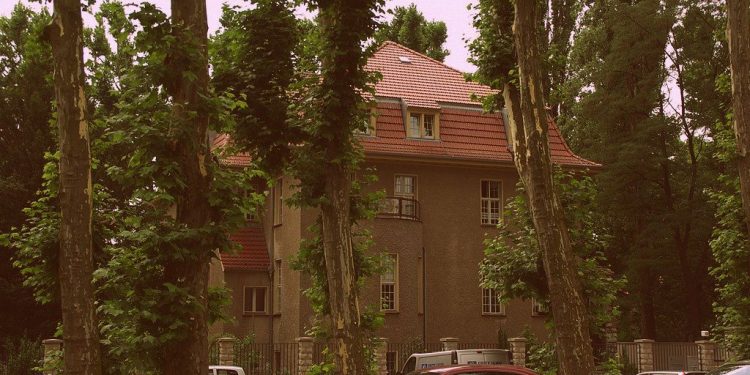

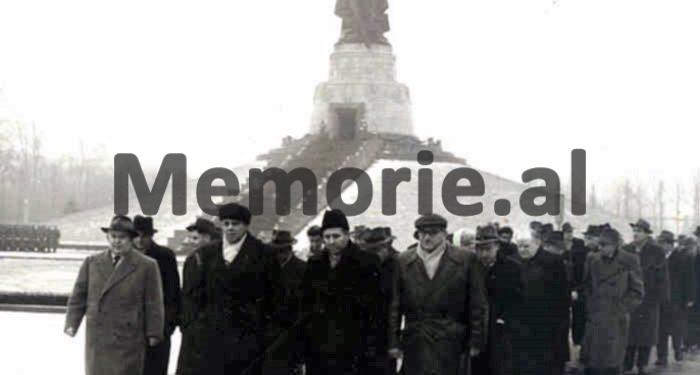
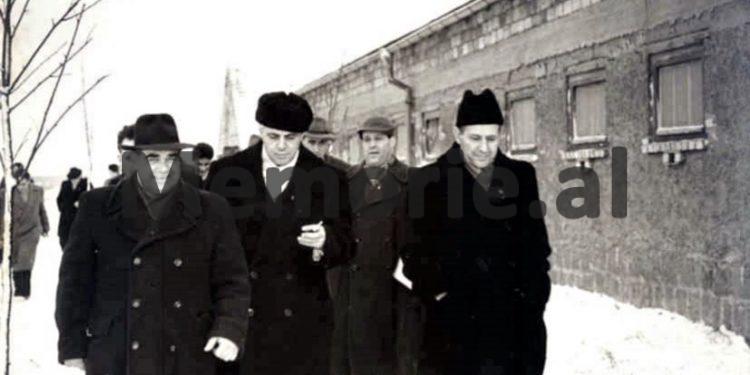
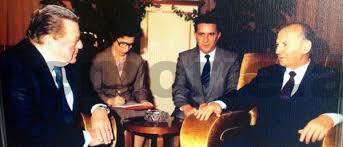
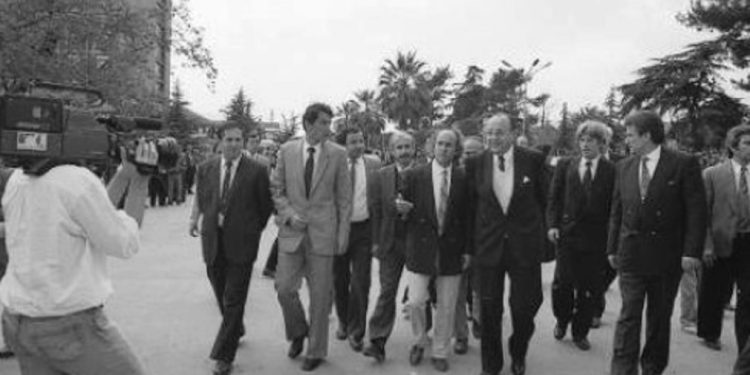
![“When the party secretary told me: ‘Why are you going to the city? Your comrades are harvesting wheat in the [voluntary] action, where the Party and Comrade Enver call them, while you wander about; they are fighting in Vietnam,’ I…”/ Reflections of the writer from Vlora.](https://memorie.al/wp-content/uploads/2025/06/admin-ajax-4-350x250.jpg)


![“The ensemble, led by saxophonist M. Murthi, violinist M. Tare, [with] S. Reka on accordion and piano, [and] saxophonist S. Selmani, were…”/ The unknown history of the “Dajti” orchestra during the communist regime.](https://memorie.al/wp-content/uploads/2026/02/admin-ajax-3-350x250.jpg)
![“In an attempt to rescue one another, 10 workers were poisoned, but besides the brigadier, [another] 6 also died…”/ The secret document of June 11, 1979, is revealed, regarding the deaths of 6 employees at the Metallurgy Plant.](https://memorie.al/wp-content/uploads/2026/02/maxresdefault-350x250.jpg)

